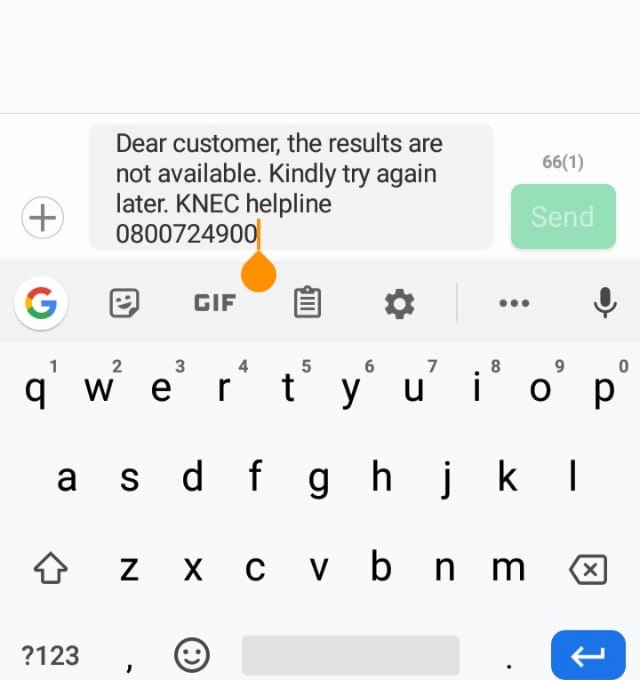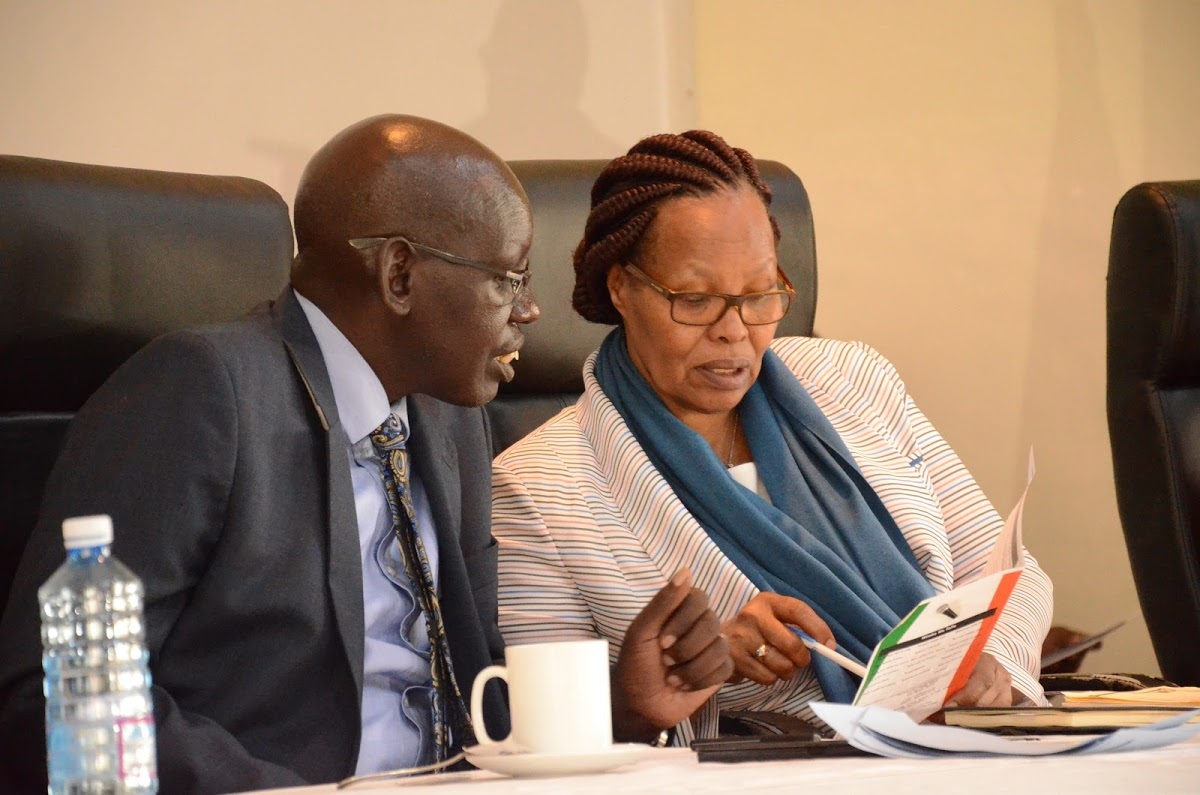As the Kenya Certificate of Primary Education (KCPE) results were being released on Monday, candidates and their parents were anxious to find out what they had scored.
The reward for eight years of hard work and investments left interested parties at the edge of their seats.
Conveniently, the Kenya National Examinations Council (KNEC) provided an SMS code where parents/pupils could find out the results in realtime. With their minds fixated on their loved ones, top candidates, top schools and interesting developments, one thing escaped the attention of most Kenyans; they were being ripped off through the shortcode.
Millions gone, just like that
Take a minute do the maths; Kenyans were being charged Ksh25 to access the results via SMS. Shortcode 20076 was the number. Kenyans swarmed it like bees punching in index numbers and hitting the send button.
A total of 1,083,456 pupils sat the exam meaning and at least two people sent the index number of each candidate for them to get the results.
A spot-check by Business Today shows that most people who sent the text said that they did not get the results on the first trial and got them on the second (spending Ksh50) or third attempt (Ksh75).
That would translate conservatively to Ksh50 for every candidate.
Make no mistake about it. Two texts are the average number sent for each pupil but it is very likely that there are families that sent three to five texts possibly more anxious to find out the results of their loved ones in different locations.
Read Also >> How Joho Turned Grade D into an A Lifestyle
Multiply Ksh50 and the number of candidates who sat the exam you will get Ksh54.17 million (Ksh54,172,800) and the conclusion that someone seated somewhere was laughing all the way to the bank will race through your mind instantly.
If you subtract the standard charges levied by service providers Ksh5 times the number of candidates your math will come to Ksh5.4 million (Ksh5,417,280).
Now minus the revenue generated by charging all the people who sent the text and the standard charges and you will get the figure Ksh48.75 million (Ksh48,755,520).
Not bad for one hour’s work, huh?
Factor in this: primary education is supposed to be free and before the introduction of the SMS code, candidates still got their results by fetching them at their learning institution – free of charge.
The government has never accounted for this money. Whoever pockets the cool Ksh48 million is anyone’s guess.
Taking advantage of candidates, parents and guardians anxiety to make a killing goes to show how far greed by those in high positions in government have convoluted the system to keep feeding their money lust.
As the country grapples with theft of public resources which has been christened corruption in efforts to normalise the vice, KNEC’s SMS platform is another form albeit carefully thought through and unleashed when the minds of Kenyans are distracted by the results’ release.
Bated breath means millions
Kenya’s national examinations results are waited for with bated breath as pupils, students and parents are anxious to know how they fared.
With this comes the demand to know what each scored and thus comes the rush for the numbers, the marks and positions.
KNEC has for the past few years been utilising technology to avail these results but it seems that the move is to profit the body at the expense of these pupils, students and parents.
With the exorbitant charges on SMSes, it seems that KNEC has found a money minting system which earns them millions in a few minutes yet, this money is not accounted for.
On the company’s website, there are no audit reports showing where these millions go neither is there a tender document showing how the SMS service was procured.
Since the time Dr Fred Matiang’i was the Education CS, the timelines for the release of these results has taken notably shorter times than was before.
Previously, KNEC would hoard the KCPE results until after Christmas and up to early March of the following year for KSCE students.
With technology, however, there is no need to do this as the exams are marked and graded faster, too.
For the results to get to the recipient, they either have to use SMS- which a majority of Kenyans do since they do not have access to the other option- login online. On the KNEC portal, students enter their exam credentials after which they are then issued their results.
While this is a cheaper option for those who would expect real-time issuance of the results, the system fails severally until a day or so after meaning that many have to resort to the money-minting SMS system.

KNEC makes a cool Ksh 48 million assuming that each pupil’s parent tried to get the results twice. In the case of both parents trying, this doubles the earnings for KNEC. The reality, though, is that many parents will send a series of requests-all billed- until they get the results.
From this, it is then possible that KNEC is making anything close to Ksh200 million (conservatively).
These millions that the examinations council is milking from Kenyans is, however, not unaccounted for. At least not in the public domain.
The money is not declared as an income for the council and the Ministry of education funds the council.
So, where does this money go? Are there projects that it funds? Does it help pay salaries or is it being invested by the council in any form like bonds?
Read >> Ordinary Kenyan Secondary Schools Among the Top 100 in Africa












You forgot, as parents are sending the sms code, schools too are sending to do analysis real time. Its mind boggling
I tell you!
This is a well-orchestrated racket.
In fact, my experience was slightly different. I first tried to access the results through my subscription bundles and it gave the message that I do not have sufficient credit to access the service. I went on to purchase Ksh. 50 airtime. When I tried, again I received a message of insufficient credit. Again, I purchased Ksh. 50 airtime so that the total came to Ksh. 100. That’s when I got the results.
Definitely, that’s a ripoff from the service provider.
KNEC needs to come out clean and account for the money they charge per SMS. They need to justify the reason why they have to charge that amount of money for every SMS.
What?!
Wow! Kenyans are being stolen from left right and centre.
It’s a shame that no one explains such scams…
Didn’t see that coming.
Its true have been asking myself such queries however it isn’t bad but I wish the SMS helpline must be procured at a reasonable price of 5= to make it affordable for parents,most of this SMS were payed by h/t helping parents to get results yet the government nor the parents never support heads of school in getting this results.because heads of school are forced even to prepare results analysis b4 borminal roll is ready ,they are forced to SMS for the results using their own monies.
That is why they no longer use their website.
Who forces the parents to use SMS they can wait for their school where they will still incur transport costs and remembers schools are on holiday.
Ideal thinking but situation on the ground is different.Over 50% dont use the service for various reasons.Also the short code service does not belong to KNEC.It is private enterprise.
Wa!
Kenyans need to speak out against this theft.
Ooo Pliz, that goes the ‘deficit of trust’ again. First anyone who has worked with online system or technology of any and knows there’s always a ‘sluggishness’ when there’s a surge in access demand. Secondly, very few parents have kids who go to school ‘a stonethrow from their house’ and it means either a matatu, nduthi or car is required to physically go check the result, not to mention the time and other inconveniences that will cost way more than 50bob. Of course it would help to make any necessary improvement but sometimes we nit pick even when we shouldn’t.. Just like all other mobile transactions like power or water bills, anyone that wants to go to the counter has the freedom to do so.